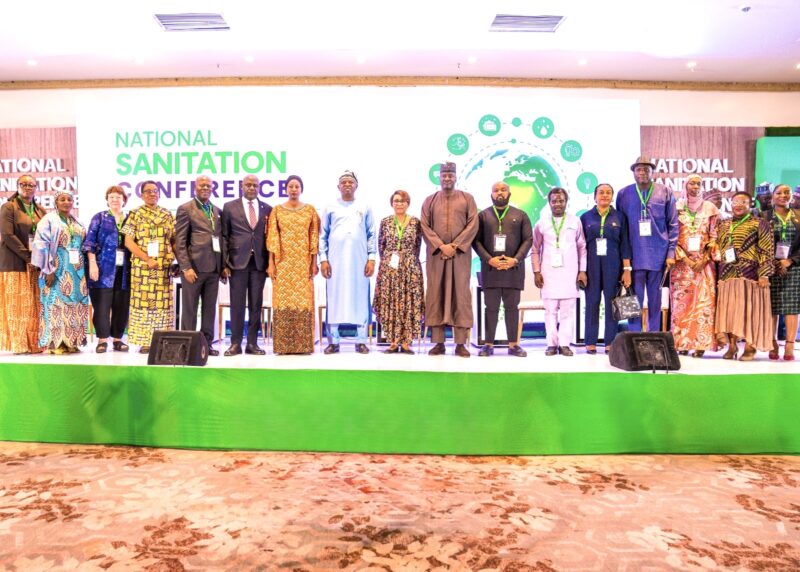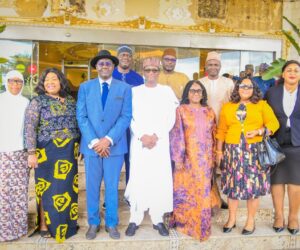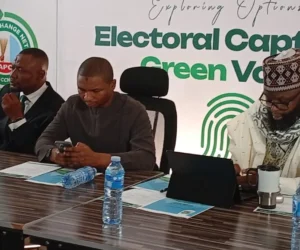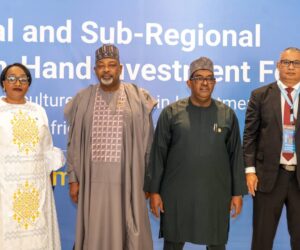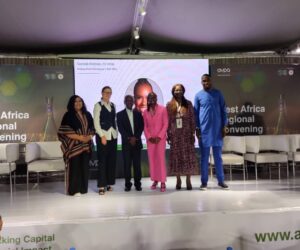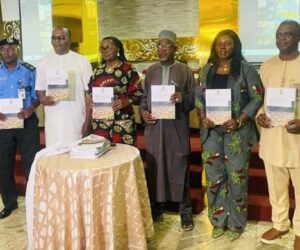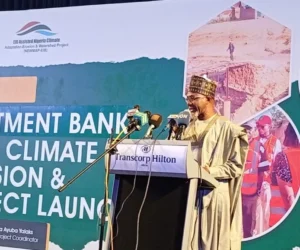By Tosin Kolade
Vice President Kashim Shettima has called for urgent and coordinated efforts to expand access to safe sanitation across the country, warning that poor sanitation continues to threaten public health and economic growth.
Shettima made the call on Monday in Abuja at the maiden National Sanitation Conference themed “Accelerating Sanitation for All”.
He was represented by Mrs Inna Binta-Audu, Special Assistant to the President on Humanitarian Affairs and Development Partners.
He said millions of Nigerians still lack safely managed sanitation services in spite progress in recent years, and stressed that inadequate facilities continue to expose communities to avoidable health risks.
The Vice President noted that open defecation remains a major concern, fuelling outbreaks of cholera and diarrhoea, and cited a World Bank report estimating Nigeria’s annual economic loss from poor sanitation at N455 billion.
“The Federal Government, in its effort to address this challenging situation, has initiated different programmes in the Nigerian WASH Sector, which have recorded significant results over the years.
“Some of the flagship initiatives in the sector include the declaration of a State of Emergency and the implementation of the National Action Plan for the Revitalisation of the Sector.
“The Federal Government has also launched the Partnership for Expanded Water, Sanitation and Hygiene (PEWASH) programme, alongside the SchoolWASH and HealthWASH Programmes, to strengthen sanitation and hygiene services nationwide.
“In addition, the Sustainable Urban and Rural Water Sanitation and Hygiene (SURWASH) Programme and the Clean Nigeria: Use the Toilet Campaign, backed by a Presidential Executive Order, aim to end open defecation across the country”.
He said monitoring has improved through the WASHNORM survey, while the government has introduced capacity-building programmes with training institutions to develop artisans and strengthen sanitation service delivery.

According to him, 158 Local Government Areas have now achieved Open Defecation Free (ODF) status, while Katsina recently became the second ODF-certified state after Jigawa, a feat he urged others to emulate.
Declaring the conference open, the Vice President called on state and local governments, the private sector, development partners and citizens to intensify efforts, saying collective action is essential to achieve SDG 6.2 and build a healthy, productive nation.
Earlier, Prof. Joseph Utsev, Minister of Water Resources and Sanitation, described the gathering as a milestone in Nigeria’s sanitation agenda, aimed at promoting public health, safeguarding citizens’ dignity, and advancing national development.
“Sanitation is more than infrastructure; it is a cornerstone of human development, a driver of productivity, and a key determinant of national prosperity,” Utsev said.
He noted that the Ministry, under President Bola Tinubu’s renewed hope agenda, convened the conference to provide a national platform for dialogue, innovation, and partnerships.
Utsev said the event brings together government officials, development partners, researchers, civil society, and the private sector, stressing that multi-stakeholder collaboration is essential to achieving SDG 6 by 2030.
He highlighted the exhibition pavilion showcasing sanitation-related information, products, and services, urging participants to share experiences, forge partnerships, and develop actionable recommendations.
Utsev appreciated President Tinubu for his policy support and Vice President Kashim Shettima for his leadership of the Clean Nigeria Campaign, and wished participants a successful conference.
 Also, Ebele Okeke, WASH Ambassador for Nigeria, called for sustained collaboration and innovation to expand safe sanitation nationwide.
Also, Ebele Okeke, WASH Ambassador for Nigeria, called for sustained collaboration and innovation to expand safe sanitation nationwide.
Okeke congratulated the Federal Ministry of Water Resources and Sanitation for convening the historic conference, describing it as a milestone in Nigeria’s commitment to a clean and healthy nation.
She emphasised that sanitation is essential for human dignity, public health, and national development.
Highlighting the Clean Nigeria: Use the Toilet Campaign, she noted its success in community mobilisation, partnerships, and behaviour change.
She urged participants to use the platform to share best practices, build alliances, and accelerate progress toward an open defecation-free Nigeria by 2030.
Okeke reaffirmed her dedication to inclusive and sustainable sanitation, particularly for women, children, and vulnerable groups.
She called on all stakeholders to unite in fostering sanitation responsibility and congratulated organisers, wishing participants fruitful deliberations and impactful outcomes.
Goodwill messages were also delivered by representatives of the Head of Service, the Ministry of Education, and WASH development partners.
Highlights of the conference include plenary sessions on strengthening sub-national governance, coordination and capacity for sanitation, and unlocking private-sector investments and financing.
The News Agency of Nigeria reports that the maiden National Sanitation Conference aims to accelerate sanitation for all, review progress and challenges, strengthen partnerships, and promote innovative practices nationwide. (NAN)
Edited by Abiemwense Moru

